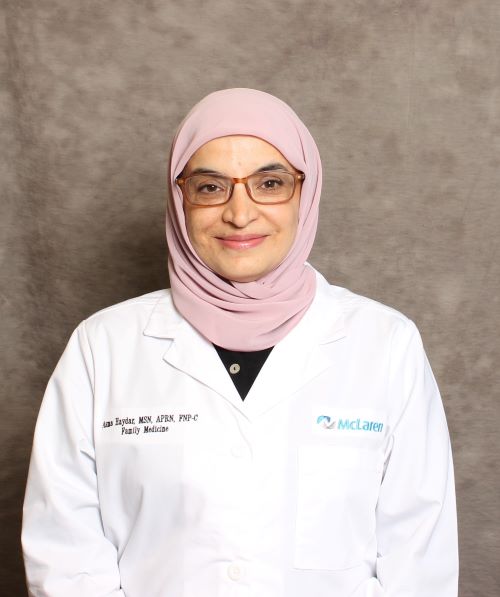Author: McLaren Flint
What do blood pressure and your heart health have to do with one another? Some experts argue, everything.
According to the CDC, the number one cause of death for both men and women in the U.S. is heart disease, and high blood pressure is a key risk factor for it.
“High blood pressure is called the silent killer because it is a disease that often has no warning signs,” said Asma Haydar, certified family medicine nurse practitioner at the McLaren Flint - Flushing Community Medical Center. “Having high blood pressure increases a person’s risk for stroke and heart attack. If a person has high blood pressure for an extended period, they may experience damage to their eyesight, kidneys, and heart without even knowing. Since many people do not experience symptoms, it is important to have blood pressure checked regularly.”
Your blood pressure is measured by two numbers — the top number (systolic) and the bottom number (diastolic) — and those numbers should be less than 120 over 80. If your blood pressure is consistently higher than normal, you have high blood pressure. Anyone can develop high blood pressure, but certain factors increase the risk, including age, genetics, and lifestyle habits.
“Blood pressure tends to rise with age,” said Asma. “Men are more likely to develop hypertension in middle age than women, but in older age, women have an increased risk for hypertension. Having a family history of high blood pressure also increases risk. Medical conditions that increase the risk of hypertension include excess weight, diabetes, kidney disease, stress, and sleep apnea. Lifestyle habits which increase risk include smoking, lack of regular exercise, drinking too much alcohol, and eating too much salt.”
Regularly monitoring your blood pressure is vital to your overall health. If you are diagnosed with high blood pressure, several options are available for managing it.
“In addition to lifestyle modifications, there are many safe and time-tested medications that can be offered,” said Asma. These medications work on different pathways to lower blood pressure. Medication is tailored to each individual based on their response, and different options are available. If someone experiences side effects after starting a new medication, it is important to let their prescriber know right away.”

There are times when high blood pressure (or hypertensive crisis) could be an emergency. If you experience any of the following, you should seek medical care immediately:
- Your systolic (top number) is greater than 180
- Your diastolic (bottom number) is greater than 120
- You’re experiencing chest pain, shortness of breath, back pain, numbness or tingling, weakness, trouble walking or speaking, or changes in vision.
In cases where a person feels fine but has high blood pressure readings at home, it is essential to contact one’s healthcare provider as soon as possible to discuss medication adjustments or next steps.
As always, consult your primary care provider for annual exams to ensure your blood pressure, cholesterol, and other key health measures remain within normal ranges.
“I recommend patients become better informed about their health and adopt heart-healthy habits, including being active every day, eating more vegetables and fruits, and reducing alcohol and excess salt,” said Asma. “As the saying goes, an ounce of prevention is better than a pound of cure. One of the things I enjoy most in my work is finding ways to preserve and improve my patients' health, so they can keep doing the things they love."
To find a primary care physician who is accepting new patients, visit mclaren.org/primarycare.